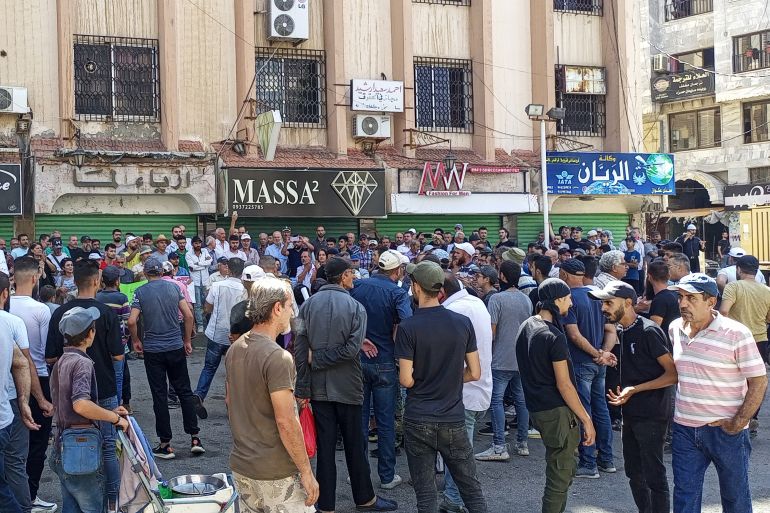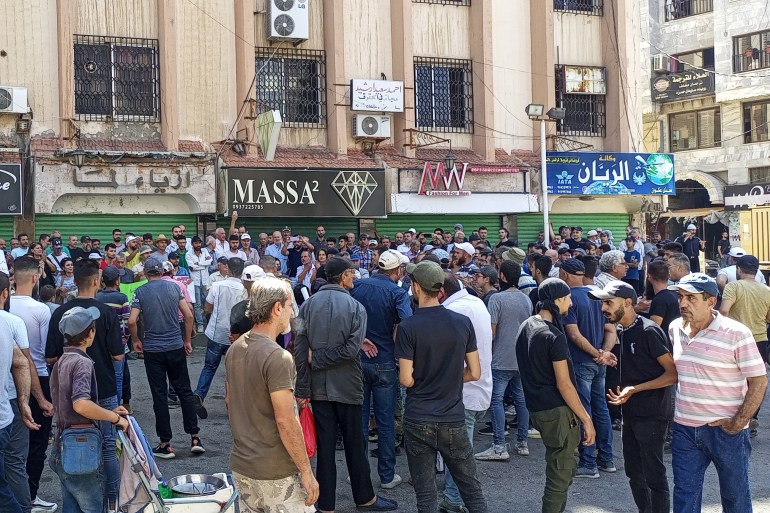Strike, protests in Syria’s Sweida enter second day
Routes into the city remain closed on Monday as protests break out over deteriorating living conditions.

A general strike and civil disobedience in Syria’s southern Sweida governorate have continued for a second consecutive day, with more than 20 protests recorded.
Routes into and out of the city of Sweida were closed by authorities on Monday, and several offices and institutions of the Syrian government, including the main building of the ruling Baath Party in the governorate, were shut down, according to local media sources.
Keep reading
list of 3 itemsTo beat the heat in northwestern Syria, people head for the water
The legacy of chemical attacks and other atrocities won’t give Syria peace
Hundreds of civilians had gathered on Sunday at the city’s Karama Square, in protest against rising prices for food and goods, as well as the Syrian government’s decision to increase fuel subsidies, but some also called for the overthrow of President Bashar al-Assad.
More than 42 protests were reported across the whole of Sweida governorate, the Sweida 24 media network said.

“We are protesting against economic decline, the state of chaos that the country is experiencing, and the widespread corruption in all state institutions, from the presidency to the smallest government department,” said Jameel, a 25-year-old resident of Sweida city.
Another protester, Mohammed, told Al Jazeera that al-Assad had consolidated state resources within the hands of his closest associates, a continuation of the approach of his father and predecessor as president, Hafez.
“By exerting economic pressure on people, selling the country’s resources to Russia, and enabling Iranian influence in Syria, al-Assad is pushing people in various provinces to divide the country into regions and adopt a self-administration system,” Mohammed said.
There has been no comment from the Syrian government on the rare protests.
Sheikh Hikmat al-Hajri, the spiritual leader of the unified Druze sect, issued a statement on Saturday expressing deep concern about the current economic situation. He called for action to achieve change and justice.
The Druze, members of a minority religious group in Syria and other parts of the Levant, make up the majority of Sweida’s residents.
Protests demanding al-Assad’s fall began in different parts of Syria in 2011 and soon spiralled into an armed conflict, after government forces attacked protesters. Sweida itself has always been controlled by the government – although anti-government protests have taken place, most notably in 2020.

Despite the focus on the economic problems Syria faces, many demonstrators also had political demands.
“The main reasons that led me to the streets with the protesters are to demand the release of all detainees, in addition to the soaring cost of living, the lack of medicines for children and the elderly, and the absence of electricity and water,” said Adam.
The 25-year-old told Al Jazeera that al-Assad’s government had since 2012 been trying to divide the Syrian people.
“We are the children of this country, and we don’t want to leave it or be second-class citizens while Russian soldiers and Iranian militias enjoy the riches of our country,” he said.
Daraa returns to the forefront
While opposition groups only retain control of territory in the northwest of Syria after being defeated in other areas by government forces and their Russian and Iranian allies, dissent has continued to flare up in government-controlled regions – despite the government’s intolerance for criticism.
Daraa, which neighbours Sweida and was previously a stronghold for opposition forces being recaptured by the government in 2018, has also seen protests in recent days.
On Saturday, dozens of protesters gathered in front of the historic Umayyad Mosque in Daraa city and raised the flag of the Syrian revolution, before chanting slogans demanding the release of detainees and the overthrow of the al-Assad government.
“We participated in a demonstration to demand the release of our detainees who have been held in al-Assad’s prisons for over 10 years, in addition to highlighting the deteriorating economic situation we are facing,” said Abu Mohammed, a farmer from western Daraa countryside.
Daraa is considered the cradle of the Syrian revolution and the first city from which protests erupted in Syria. Armed opposition factions had control of most of the wider governorate by the end of 2011.
After years of battles with the government, a settlement agreement under Russian supervision was reached in which the opposition forces agreed to hand over their heavy weaponry and dissolve themselves, while allowing members to retain light arms.
The outcome was markedly different in other parts of Syria, where opposition fighters and supporters were either killed, imprisoned or forcibly displaced upon the return of government control to their areas.
However, opposition supporters in Daraa, like Abu Mohammed, point out that a more underhanded crackdown has continued in the governorate.
“Since the al-Assad regime took control of Daraa, the assassinations of activists have not ceased, in addition to security crackdowns and extortion we face at al-Assad regime checkpoints,” he said, adding that the government has, since taking control of Daraa, pushed people to flee through systematic shelling of cities and villages, and conducted a widespread arrest campaign.
“If this regime doesn’t fall, our living conditions won’t improve, the security grip won’t be loosened, and we won’t live peacefully in our country,” said Abu Mohammed.
“We welcome the uprising of our people in Sweida,” he added. “And we call upon our people in Damascus, Homs, Aleppo, and all Syrian provinces to rise up against this regime once again.”